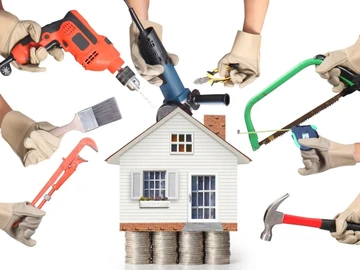Purchasing a property in Zimbabwe can be an exciting but daunting prospect, as it often involves a significant financial commitment. Before diving headfirst into the property market, it's essential to take a deep breath, step back, and consider the myriad factors that could influence your decision.
From location and property type to legal considerations and local market trends, a well-informed buyer is an empowered buyer. By approaching the process with a level head, a wealth of information, and perhaps even a dash of intuition, you can navigate the real estate terrain with confidence and find the perfect property for your needs.
1. Property Rights:
Understand the property rights and any restrictions on the property. Property rights are incredibly important when it comes to purchasing property in Zimbabwe. They ensure that you have legal ownership of the property as well as rights to use, develop, or sell it. Without property rights, you could be at risk of disputes, fraud, or even losing your investment. For example, one of the key aspects of property rights to consider before purchasing includes title deeds.
2. Title Deeds:
Ensure the property has a valid title deed, which serves as proof of ownership. Title deeds are essential when buying a property, as they serve several key functions: they provide legal proof of ownership, protecting the buyer's rights and interests in the event of a dispute or legal issue; they are usually required by banks and other lenders for mortgage applications, ensuring that the property can be used as collateral for a loan; and they provide a document trail that can be easily referenced in the future, reducing the risk of confusion or misunderstanding. In short, title deeds are the backbone of property ownership in Zimbabwe, making them an indispensable part of the buying process.
3. Location:
Consider the neighbourhood, proximity to amenities, and potential for development. Location, location, location! It's a cliché for a reason. The neighbourhood and proximity to amenities can make or break the quality of life for a homeowner. Consider the commute to work, school, shopping, and entertainment. A property in a desirable location can increase in value over time, while a remote or unsafe location can lead to a decrease in value and quality of life.
4. Condition:
Assess the property's condition, including any needed repairs or renovations. The condition of a property is crucial to consider before making a purchase. A thorough assessment can reveal any needed repairs or renovations, which can help you avoid costly surprises down the road. Consider the age of the property, the condition of the roof, plumbing, and electrical systems, and any signs of pest or water damage. A property in good condition can provide peace of mind and save you money in the long run.
5. Pricing:
Research the market value and negotiate a fair price. Pricing is a critical factor when buying property. Researching the market value of the property can help you negotiate a fair price and avoid overpaying. Consider comparable sales in the area, the property's condition, and the seller's motivation. A well-researched buyer can make an informed offer and potentially save thousands of dollars.
6. Legal Requirements:
Comply with legal requirements, such as paying duty and taxes.
Finally, complying with legal requirements is essential when buying property. Paying duty and taxes, transferring ownership, and ensuring all necessary permits and inspections are completed can help you avoid legal and financial headaches. A reputable real estate agent or lawyer can guide you through the process and ensure a smooth transaction. Remember, a little due diligence can go a long way toward protecting your investment!
7. Zoning and Regulations:
Ensure the property is zoned for the intended use.Housing and regulations are crucial considerations when buying property. Ensure the property is zoned for the intended use, whether it's residential, commercial, or industrial. Violating zoning regulations can lead to fines, legal issues, and even the forced removal of structures. Research the local zoning laws and verify the property's zoning designation to avoid any potential issues.
8. Environmental Factors:
Consider environmental factors like proximity to pollution sources or natural disaster risks. Environmental factors can significantly impact your quality of life and property value. Consider the proximity to pollution sources, such as industrial sites, highways, or airports. Also, research the area's natural disaster risks, like flooding, landslides, or wildfires.
9. Security:
Evaluate the property's security features and the neighbourhood's safety.. .Security is a top priority when buying property. Evaluate the property's security features, such as gates, fences, alarms, and cameras. Also, assess the neighbourhood's safety record, including crime rates and police response times. A secure property and neighbourhood can provide peace of mind and protect your investment.
10. Professional Guidance:
Seek advice from experts such as a real estate agent, lawyer, or property expert. Professional guidance is essential when navigating the complex process of buying property. They can help you make informed decisions, avoid potential pitfalls, and ensure a smooth transaction. For example, ask a local real estate agent about the best areas to live in and the current market conditions.
11. Financing:
Explore financing options and understand the terms and conditions. Financing is a critical aspect of buying property. Explore financing options, such as mortgages, loans, or grants, and understand the terms and conditions. Consider factors like interest rates, repayment terms, and hidden fees. Don't rush into a financial commitment; carefully evaluate your options and seek professional advice if needed.
12. Property Taxes:
Research and understand property tax obligations. Property taxes can significantly impact your annual expenses. Research and understand the property tax obligations in the area, including the tax rate, payment schedule, and any exemptions or rebates available. Factor these costs into your budget to avoid any unexpected surprises.
Remember to exercise caution and thoroughly research before making a purchase. Here are some additional tips and tricks for buying a property in Zimbabwe.
- Research, research, research: Learn as much as you can about the property market in Zimbabwe, including current prices, trends, and regulations. For example, research the different types of properties available, such as apartments, houses, and plots of land.
- Work with a reputable agent: Find a trusted real estate agent who knows the local market and can guide you through the process. For example, ask for referrals from friends or family members who have recently bought or sold a property in Zimbabwe.
- Inspect before you invest: Always inspect the property thoroughly before making an offer, looking for any signs of damage or needed repairs. For example, check for cracks in the walls, broken windows, or signs of termite damage.
- Don't rush: Take your time and don't feel pressured to make an offer on a property that doesn't feel right. For example, if you're not sure about the neighborhood, take some time to explore the area and talk to local residents.
- Get a lawyer: Have a lawyer review the sale agreement and ensure that your rights are protected. For example, make sure the lawyer checks for any outstanding debts or liens on the property.
- Plan for extras: In addition to the purchase price, consider additional costs like transfer fees, taxes, and insurance. For example, factor in the cost of connecting utilities like water and electricity.
- Visit at different times: Visit the property at different times of day and in different weather conditions to get a full sense of the property. For example, visit during the day to see the natural light and at night to see the security features.
- Take photos and notes: Document the property with photos and notes to refer back to later. For example, take photos of any damage or needed repairs and make notes about the condition of the property.
- Don't be afraid to negotiate: Negotiation is a normal part of the buying process, so don't be afraid to make an offer that's lower than the asking price. For example, if you find out that the property has been on the market for a long time, you may be able to negotiate a lower price.
- Consider the community:Think about the community and neighborhood you'll be living in. For example, is the area safe and secure? Are there community amenities like parks or playgrounds?
- Be prepared for challenges: Buying a property in Zimbabwe can be challenging, especially for foreigners. Be prepared for bureaucratic delays and other obstacles. For example, be patient and persistent when dealing with government officials or banks.
- Be aware of corruption: Unfortunately, corruption is a reality in many third-world countries, including Zimbabwe. Be aware of the risks and take steps to protect yourself, such as working with reputable agents and lawyers. For example, be cautious of agents who ask for bribes or other forms of payment in exchange for favours.
- Consider the economy: Zimbabwe's economy has faced challenges in recent years, including hyperinflation and currency fluctuations. Consider the economic conditions and how they may impact your investment. For example, if the currency is fluctuating rapidly, it may be wise to wait until the market stabilises.
- Research the seller: Research the seller and their reputation before making an offer. For example, check if the seller has a history of selling properties quickly or if they have any outstanding debts.
- Get a survey: Consider hiring a surveyor to inspect the property and provide a report on its condition. For example, a surveyor can check for any structural damage or signs of termite damage.
- Don't send money: Never send money to someone you don't know, especially if you're buying a property that is unseen. For example, use a reputable escrow service to hold the funds until the sale is complete.
- Seek government assistance: If you're a foreigner, seek assistance from your government's embassy or consulate in Zimbabwe. They can provide valuable guidance and support during the buying process. For example, they may be able to provide information on the local market and help you navigate the legal system.
Remember, buying a property in Zimbabwe requires careful consideration and planning. By following these tips and tricks, you can make the process smoother and less overwhelming. Good luck!
 Continue with Facebook
Continue with Facebook
 Continue with Email
Continue with Email














